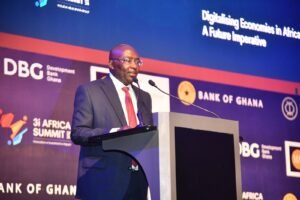
The writer
The last few months have witnessed a rude awakening of the consciousness of the Ghanaian over what has become known as the broken system.
This awakening has culminated into series of campaigns which have come to highlight either the need to do something about the broken-down system or what is being done about it.
At the forefront of these campaigns are those operating under the hashtags #fixthecountrynow and #fixingthecountry. Although there is a third one which is #fixourattitudenow, the emphasis has been on the first two.
Indeed, a careful view of all the three campaigns would reveal a general consensus which indicate that the country has not attained the aspirations it set out for itself at independence.
The main imperatives of all the campaigns are but not limited to corruption, poor social infrastructure, road infrastructure, weak bureaucratic systems and growing unemployment.
While there is no argument about existence of these challenges, the inability to come to consensus on what has been done about them over the years perhaps is what has divided opinion in the country.
For those against the hashtag #fixthecountrynow, there is no gainsaying that there are lot of things which require a fix in the country, however, it is also their belief that persons behind the campaign have wittingly crafted their message to score political points rather than a genuine concern for addressing the issues raised.
They contend that it is wrong to lay blame at the doorsteps of the current administration because the challenges, as listed, were inherited and even so, all administrations from independence have tried their best to deal with the situation.
History
A historical overview of the country’s political and development trajectory reveals that even though Ghana is confronted with myriad of challenges, each government in one way or the other has tried to do something about it albeit not in same proportions.
The government of Ghana’s first President, Osagyefo Dr Kwame Nkrumah, has often been described as the best moments of the country’s development history.
This is due to the fact that under his government, the country witnessed the execution of some monumental projects and what readily comes to mind are, the Tema Township, Tema Harbour, Tema Motorway, the Akosombo Dam, series of factories, educational infrastructure and other developmental projects.
For many, while the achievements of the first president of Ghana are unassailable in the country’s political history, these achievements were a matter of course since the colonial administration prior to leaving, handed over a well-endowed treasury for the new government.
In addition to the huge sums of money bequeathed to the administration, the country had no liabilities towards any development partner at the time.
Despite the huge progress made in terms of providing social infrastructure, the government of Osagyefo Dr Kwame Nkrumah was not only accused of being a dictator but was also overthrown over allegations of corruption and nepotism.
The next civilian government which took over from President Nkrumah was led by Dr K.A. Busia. This followed the military junta led by General Akwasi Afrifa, Joseph Ankrah etal which overthrew the Convention People’s Party (CPP) of Osagyefo Dr Kwame Nkrumah.
The regime of Dr Busia also pursued a lot of policies, to further develop the country and its citizens.
The concept of rural electrification, expansion of secondary and teacher training education to cover rural communities were initiated by this regime.
The introduction of wooden (teak tree) electric poles as a replacement to concrete ones to ensure environmental sustainability which still remains relevant today was the brain child of Dr Busia.
Unlike the government of Dr Nkrumah, that of Busia spent barely 27months in office before it was overthrown by another military junta led by Ignatius Kutu Acheampong in 1972.
Although the military government of Acheampong achieved a lot over the seven-year period it ruled, it was also accused of plunging the country into unsustainable debt which almost paralysed the country.
The military government of Acheampong was thus overthrown amidst corruption allegations and mismanagement by another military junta which subsequently restored the country to democracy.
The democratic government of Dr Hilla Liman was elected in 1979 and like all his predecessors, he contributed his part in deepening democratic values in the country.
As part of his accomplishments, he championed economic programmes to help correct the mess created by the Acheampong regime. However, as fate may have it, his government was also toppled by Ft. Lt. J. J. Rawlings in a military junta in 1981 amidst similar allegations like that of all heads of state.
Mr Rawlings undertook many development projects including decentralisation, local government, continuation of rural electrification to help bring development to the people at the local level.
President Kufour who took over in 2001 as the second elected president in this fourth Republic, carried on with vigorous life improving policies to bring some positive change to the masses.
Developments and interventions like the School Feeding Programme, Metro Mass Transit, Capitation Grant for basic schools, National Health Insurance Scheme, roads and telecommunications infrastructure, among others, were done to lift the country to another development path.
President Mills who also took over in 2009, continued with tax mobilisation policy as a way of improving revenue generation, added more number to the School Feeding Programme and expanded educational infrastructure to help increase access and intake of students at our various levels of education.
Following the demise of Prof Mills, former president Mahama took the mantle of leadership from 2012 and also won the next elections and continued the pace of development to 2017.
The Akufo-Addo regime
It is important to emphasise that the current President, Nana Addo Dankwa Akufo-Addo, who happens to be bearing the brunt of the effects of many decades of inefficiencies of the country’s leadership, took over in 2017 which happened also to be the time the country was going through various forms of economic challenges which had compelled his predecessor to take the country to the IMF for economic bail out.
This notwithstanding, the administration of Nana Addo has embarked on several economic interventions as way of fixing the country.
The government has introduced a number of monumental flagship programmes including the Free Senior High School which has made the problem of people dropping out of school due to financial difficulties a thing of the past.
The power sector, which had been experiencing energy crises from time to time, popularly known as “dumsor”, has been tackled and now being managed prudently.
The obsolete pylons and equipment are under maintenance, and some being replaced to ensure energy efficiency and sustainability.
The backlog of unposted nurses and graduate teachers in 2016 among others have had all of them posted and duly employed.
The current leadership, led by president Akufo-Addo, has posted all these graduates who are now earning something to make a living.
Revenue leakages through various loopholes have seen huge resources cascading into private and unapproved channels.
But the digitisation agenda of the current leadership has helped to plug many leakages especially at the ports to help improve revenue mobilisation for development.
The public sector has also been opened up to recruit many graduates to help them to also honour their social responsibilities.
Areas like the local government, Ghana Education Service, Ghana Health Service, Forestry Commission have engaged thousands of people to help reduce unemployment in the country.
Many roads and educational infrastructure have been done to ease traffic. The Pokuase interchange, which has been constructed by the Akufo-Addo’s administration, has helped to solve huge traffic problems.
The Tamale interchange is also nearing completion.
On health care delivery, many hospitals have been given a face-lift with new structures built to augment the existing ones.
The 44-year-old maternity block at Komfo Anokye Teaching Hospital in Kumasi which has remained there since Acheampong’s regime, has been tackled with funds raised by the first lady Mrs Rebecca Akufo-Addo.
Previously, there were few or no ambulance services in various districts across the country. Many emergency situations that could have been rescued, claimed a lot of lives unfortunately.
But the current government, led by president Akufo-Addo, has fixed that problem, by providing at least 275 well equipped ambulances to every constituency in the country to help deal with emergencies.
In the cocoa sector, massive and deliberate interventions have been put in place to increase production to a record 1,030,000 metric tonnes, the highest ever since independence.
From the foregoing, it is clear that fixing the country is not and cannot be an event but a process which has seen every administration do its bit.
The Akufo-Addo’s government is feeling the heat of the call because it is the current administration in power. Although the administration has done a lot in fixing the country, it should be reminded that, it still holds the mandate of the people, and like Oliver Twist, more is demanded of it to fix the country.
The writer is a Records Information Management Project Coordinator of a private company in United States of America.








